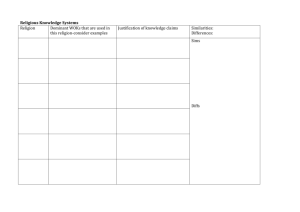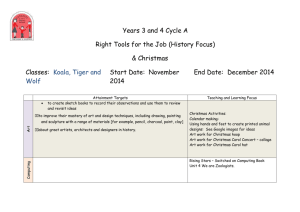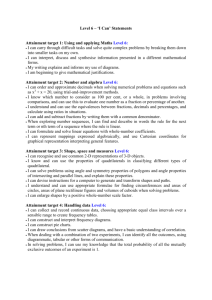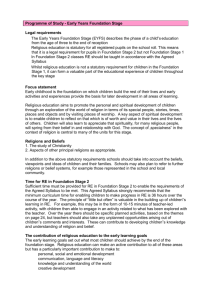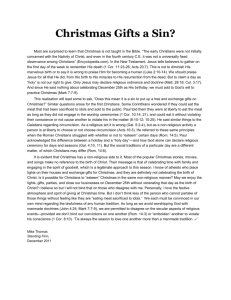Religious Education Policy - Hampton Wick Infant & Nursery School
advertisement
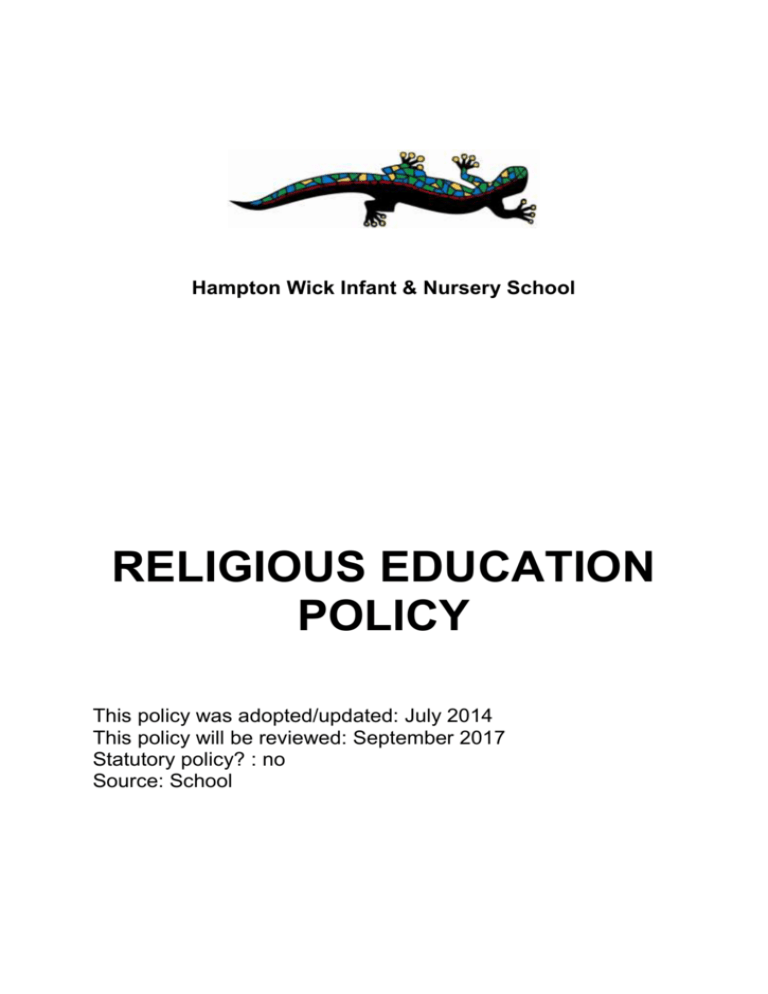
Hampton Wick Infant & Nursery School RELIGIOUS EDUCATION POLICY This policy was adopted/updated: July 2014 This policy will be reviewed: September 2017 Statutory policy? : no Source: School HAMPTON WICK INFANT AND NURSERY SCHOOL RELIGIOUS EDUCATION POLICY Introduction The 1996 Education Act required that Religious Education should be taught to all pupils in full-time education, except those withdrawn at the request of their parents. Religious education should be taught in accordance with the Richmond upon Thames agreed syllabus. Aims Within the framework of the LEA agreed syllabus, we aim in the Religious Education curriculum to: Promote the spiritual, cultural and social development of the children. Develop knowledge and understanding of religious beliefs, practices and writings. Develop knowledge and understanding of Christian and other beliefs and practices. Develop knowledge and understanding of the beliefs and practice of other principle religions represented in Great Britain. Develop sensitivity to and respect for the beliefs and values of others Allow children to learn from religions; reflecting on their own beliefs, values and those of others who take a differing view. Create an environment where children reflect on the awe and wonder of the world. Allow children to begin to evaluate their learning experiences in Religious Education. Specifically for children in the Foundation Stage, we aim to: Enable children to talk about past and present events in their own lives and in the lives of family members. Know about similarities and differences between themselves and others, and among families, communities and traditions. Objectives The overall objectives within the teaching of Religious Education at our school are: To develop children’s growth of their own sense of self. To develop their understanding of their strengths and weaknesses. To reflect on and develop their unique potential and their will to achieve. To foster children’s feelings of awe, wonder, delight, joy and mystery and to extend their natural curiosity. To develop children’s sense of belonging, for example, to the school community and to society as a whole. To develop children’s ability to enter imaginatively into experiences, beliefs and the desires of others. To develop children’s ability to be able to think about why they believe something and how they want to behave as a result. To enable children to show respect, care and concern towards themselves and others. Attainment Targets We aim to ensure that all children achieve in their learning, and aim to provide opportunities to develop initiative, independence and the children’s ability to carry out their own investigations, as appropriate to their age. Learning activities should also include opportunities for analysis, interpretation, evaluation and reflection. Foundation Stage Attainment Target – Religious Education is included in the specific area of learning headed ‘Understanding the World’ where children learn to make sense of their physical world and their community through opportunities to explore, observe and find out about people, places, technology and the environment. Specifically they are learning the similarities and differences between themselves and others and among families, communities and traditions. Key Stage One Attainment Target 1- Children learn about religions by acquiring and developing knowledge and understanding of Christianity, together with aspects of Islam, Hinduism and Judaism. Key Stage One Attainment Target 2- Children learn from religion by enhancing their own spiritual and moral development. (see Richmond Agreed syllabus). Teaching Strategies Broad and rich teaching strategies ensure that children get a wide range of opportunities to develop their skills. Those employed will be a mixture of the following: Whole class/ small group teacher input Whole class circle time (group circle time) Whole school assemblies Art and craft activities Music activities Dance and Drama experiences Curriculum Overview Autumn 1 Nursery Autumn 2 Belonging & class/ school codes Divali What does it mean to belong? B/D Why is light important to us? A/E Christmas Reception What makes us special? B/D How do we remember things that are important to us? C/F Year One Who were Jesus’ friends? A/D Why is Christmas important for Christians? A/E (remember that many of Jesus’ friends were rejected by the society) Year Two Why is the Bible a special book for Christians? C/E What are your big questions about Christmas? C/E (use Christmas symbols as a starter) Spring 1 Chinese New Year St Valentine’s Day Shrove Tuesday What is a celebration? B/D Why are some stories special to us? A/F What makes a church different from other buildings? C/F How does a church show what Christians believe? B/E Spring 2 Mothering Sunday Easter Summer 1 Summer 2 Final day of Passover St George’s Day Fathers Day How can we show people that they are important to us? C/F What is a good friend? C/F What makes a good leader? A/E What makes something precious? B/E What makes our world wonderful? C/E What makes a place special? A/D Is the world a fair place? A/F Which was the most important story Jesus told do you think? What makes a good Rabbi? (principles of a good leader) B/E What do eggs have to do with Easter? How do we remember people who die? What does what we wear say about us? C/D Why is Easter important for Christians? How can I make a difference in the world? B/F How should Christians lead their lives? Do you need to go to church to be a Christian? B/D Why do Jewish children celebrate Shabbat & Hannukah? Is there any point to fasting? A/F Do you need to go to the mosque to be a good Muslim? Resources Artefacts and resources are used to enable children to understand the characteristic use of non-verbal forms of expression in religions, through visual arts, symbols, mime and rituals. We have a wide range of resources at school to support the teaching and learning of Religious Education. These include: Books (in the RE cupboard and in the Library) Photographs Artefacts Music Parents input Visits from faith leaders in the wider school community QCA documents Festival planners (forwarded to all staff and on display in the staff room) Resources forwarded by subject leader for particular festivals and celebrations Equal Opportunities All children will have access to activities and resources linked to the programme of study for each attainment target, relevant to their developmental needs and age. Activities will be differentiated to enable all to achieve. All children will be encouraged to fulfil their potential. Special Needs All children will have access to the Religious Education Curriculum. Children with special needs will be offered a differentiated programme of study. Cross Curricular Themes Religious Education will be linked to seasons, festivals and topics where appropriate. Involvement of Parent/Carers Parent/Carers will be encouraged to attend class assemblies, attend Harvest festivals, attend the Christmas production and other special celebrations. Parents are invited to help with children’s learning in school through involvement during focus weeks and celebrations, allowing children to experience authentic and hands-on learning about religious festivals. Assessment Children are encouraged to self-assess during and at the end of RE learning activities. This, as well as teacher assessments, will inform teachers in planning and developing the curriculum to tailor it to ensure children are moved on in their learning. A summative assessment of a child’s skills, knowledge and understanding in Religious Education is included in children’s annual report to parents. Monitoring The Religious Education Leader monitors the standards of children’s work and quality of teaching through work samples, learning walks and lesson observations. Impact The RE subject leader analyses end of year data from the EYFS assessments, Foundation Stage Profile Points and attainment in RE through Key Stage 1 reports and assessments. An increase in results in the data will show the positive effect RE learning has had, and will suggest that the aims and objectives for this policy are being achieved. Date Written: September 2012 Review: September 2013
